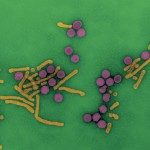Lien vers Pubmed [PMID] – 12198663
Hepatology 2002 Sep;36(3):692-701
E-cadherin is a key cell adhesion protein implicated as a tumor/invasion suppressor in human carcinomas and a binding partner of beta-catenin, which plays a critical role in Wnt signaling and in tumorigenesis. Here we report genetic and expression studies of E-cadherin and beta-catenin in hepatocellular carcinoma (HCC). Immunohistochemical analysis of E-cadherin expression in 37 HCCs and adjacent nontumor tissues revealed important variations among tumor samples, ranging from complete or heterogeneous down-regulation in 35% of cases to marked overexpression in 40% of tumors. Loss of E-cadherin expression was closely associated with loss of heterozygosity (LOH) at the E-cadherin locus and methylation of CpG islands in the promoter region (P <.002), predominantly in hepatitis B virus (HBV)-related tumors (P <.005). No mutation of the E-cadherin gene could be detected in the tumors examined, suggesting the requirement for reversible mechanisms of E-cadherin down-regulation. In most HCCs, including E-cadherin-positive and -negative cases, beta-catenin was strongly expressed at the cell membrane and nuclear accumulation of the protein was correlated with the presence of mutations in the beta-catenin gene itself, but not with E-cadherin loss. At difference with a number of epithelial cancers, vascular invasion was frequently noted in HCCs showing enforced expression of the membranous E-cadherin/beta-catenin complex. In conclusion, these data support the notion that E-cadherin might play diverse and seemingly paradoxic roles in HCC, reflecting specific requirements for tumor growth and spread in the liver environment.
